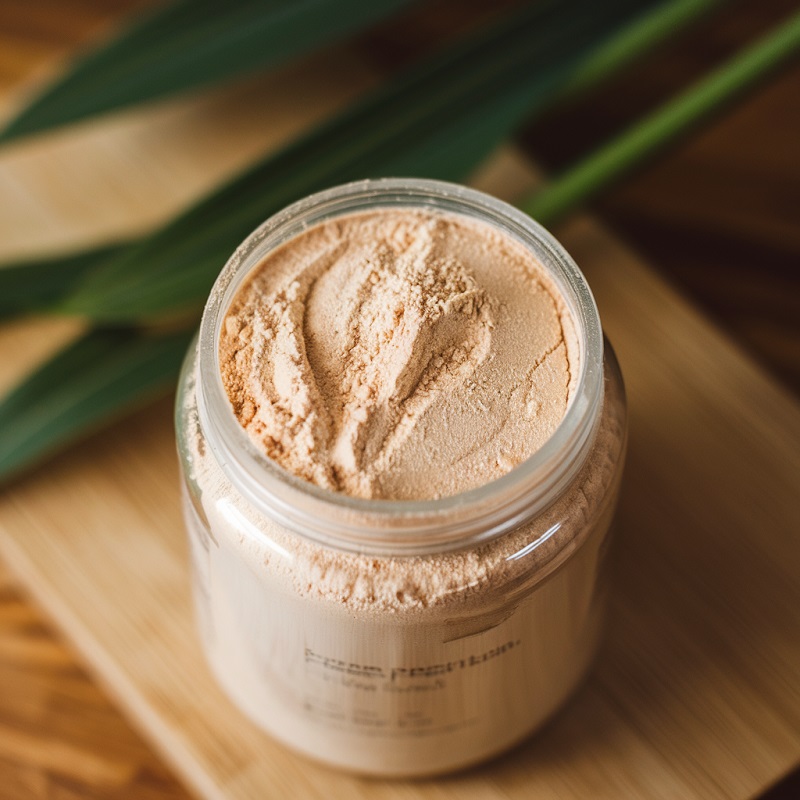Some days, cooking a full meal just isn’t realistic. Busy mornings, back-to-back meetings, or post-workout hunger can leave you scrambling for something quick. That’s where a scoop of plant based protein powder can become a real game changer. But can it truly replace a whole meal—or is it just a glorified snack?
Let’s break it down.
What Is Plant Based Protein Powder?
Plant based protein powder is a protein-rich supplement derived from sources like peas, hemp, brown rice, pumpkin seeds, or soy. It’s a go-to for vegans, vegetarians, and anyone looking to cut down on dairy or animal products. Many powders now come with added nutrients, fiber, and probiotics—making them more than just a protein source.
Science Behind Plant-Based Protein
Plant-based protein powders are more than just trendy—they’re backed by science. Whether you’re building muscle, managing weight, or improving digestion, plant protein can meet your body’s needs when used properly.
Are Plant Proteins Complete?
One common concern is whether plant-based protein powders provide all nine essential amino acids—the building blocks of protein that your body can’t make on its own.
✅ Good news: While individual sources like rice or pea may not be complete on their own, most high-quality plant-based powders use blends (like pea + rice or pea + hemp) to provide a complete amino acid profile, similar to what you’d get from whey or meat.
Study Spotlight: A 2015 study published in the Journal of the International Society of Sports Nutrition found that pea protein was just as effective as whey protein in promoting muscle thickness after resistance training.
Muscle Growth & Recovery
Protein is essential for muscle repair and growth—and plant protein can do the job just fine.
- Leucine, an amino acid critical for muscle protein synthesis, is found in good amounts in pea, soy, and pumpkin seed proteins.
- Some brands now fortify their formulas with extra leucine or branched-chain amino acids (BCAAs) to match the muscle-supporting power of animal-based proteins.
Expert Insight: According to Dr. James Loomis of the Barnard Medical Center, “Plant-based protein, when consumed in adequate amounts, can fully support strength training and athletic performance.”
Satiety and Weight Management
Plant proteins often contain fiber, which is missing from animal protein sources. Fiber helps:
- Keep you full longer
- Stabilize blood sugar levels
- Support healthy digestion
Combined with healthy fats and complex carbs, a plant-based protein shake can curb cravings and reduce overall calorie intake, making it a strong ally for weight loss or maintenance.
Study Insight: A 2018 randomized trial published in Nutrition Journal found that participants consuming plant-based protein meal replacements reported greater satiety and fewer cravings than those using animal-based formulas.
Digestive Benefits
Plant proteins are naturally lactose-free and often gentler on the stomach than whey or casein. Many powders include added digestive enzymes or probiotics, making them ideal for:
- People with dairy sensitivity
- Those dealing with bloating or GI discomfort
Sustainability: A Science-Backed Bonus
Choosing plant-based protein powders isn’t just good for your body—it’s good for the planet. A landmark study in Science (2018) concluded that producing plant protein uses significantly less land, water, and energy than animal protein, while emitting fewer greenhouse gases.
Can Plant Based Protein Powder Replace a Meal?
In short—yes, but only when done right.
vegan protein powder offers a solid protein boost, but that doesn’t automatically make it a full meal. To truly take the place of breakfast, lunch, or dinner, it needs to do more than curb your hunger—it should help you feel fuller for longer and provide a mix of nutrients that support your energy and focus throughout the day.
While plant based protein powder offers a strong protein punch (typically 20–30 grams per serving), it lacks the full nutritional spectrum of a meal. To truly serve as a meal replacement, your shake should include:
- Healthy fats (e.g., avocado, almond butter)
- Complex carbs (e.g., oats, bananas)
- Fiber (e.g., chia seeds, flaxseeds)
- Micronutrients (e.g., spinach, kale, berries)
Pro tip: Think of your shake as a “meal in a blender,” not just protein and water.
When Should You Use Plant Based Protein Powder as a Meal Replacement?
Meal replacement with plant based protein powder makes sense when:
- You’re rushing in the morning
- You need post-workout fuel
- You’re managing your weight with controlled portions
- You’re traveling or on-the-go
In these cases, it’s better to have a balanced shake than skip a meal or hit the drive-thru.
How to Make a Balanced Meal Replacement Shake
Here’s a basic formula to turn plant based protein powder into a satisfying and nutrient-packed meal:
Base Ingredients:
- 1 scoop plant based protein powder
- 1 cup unsweetened almond or oat milk
- 1/2 frozen banana
- 1 tbsp flaxseed or chia seeds
Add-Ins for Balance:
- 1 tbsp almond or peanut butter (healthy fats)
- Handful of spinach or kale (micronutrients)
- 1/3 cup rolled oats (complex carbs)
- Cinnamon, cocoa powder, or vanilla for flavor
Blend and enjoy a creamy, filling shake that checks all the boxes.
Benefits of Plant Based Protein Powder
Why are more people switching to plant based protein powder?
- Dairy-free and easy to digest
- Lower environmental impact than animal-based protein
- Supports muscle recovery and energy
- Free from artificial sweeteners, additives, and fillers (in high-quality brands)
Some brands even include added greens, vitamins, and minerals to help close nutritional gaps—perfect for people with fast-paced lifestyles.
How Does It Compare to Whey Protein?
While whey is popular, plant based protein powder holds its own:
| Feature | Plant Based Protein | Whey Protein |
| Digestibility | Easier on the stomach | May cause bloating in lactose-sensitive users |
| Allergens | Dairy-free, soy-free options | Contains dairy |
| Nutrient Additions | Often includes fiber, greens, or probiotics | Usually pure protein |
| Sustainability | Eco-friendly crops like peas and rice | Higher carbon footprint |
What to Look for in a High-Quality Plant Based Protein Powder
When choosing a plant based protein powder, read the label. Look for:
- Organic or non-GMO ingredients
- No added sugar or artificial sweeteners
- Complete protein sources (e.g., pea + rice blend)
- Added fiber, probiotics, or greens
- Third-party testing or clean-label certifications
Avoid:
- Long ingredient lists with unpronounceables
- Cheap fillers, gums, and thickeners
- Overly processed soy-based blends
Top 5 Plant-Based Protein Powders for Meal Replacement
- KOS Organic Plant Protein
- Price: Approximately $45 for a 2.6-pound container.
- Nutritional Value (Per Serving): 20g protein, 170 calories, 6g fat, 9g carbohydrates, 2g fiber.
- Food Quality: Certified organic, non-GMO, gluten-free, and free from artificial sweeteners.
- Availability: Available on the KOS website, Amazon, and select health food stores.Health+1Women’s Health+1
- Expert Recommendation: Praised for its smooth texture and natural flavor, making it a versatile addition to various recipes. Health
- Customer Rating: 4.5 out of 5 stars based on over 3,000 reviews on Amazon.
- HLTH Code Complete Meal (Plant-Based Version)
- Price: Approximately $59.95 for a 2.2-pound bag.
- Nutritional Value (Per Serving): 27g protein, 400 calories, 27g fat, 13g carbohydrates, 9g fiber.
- Food Quality: Includes fermented plant protein for improved bioavailability, digestive enzymes, vitamins, and minerals.Michael Kummer
- Availability: Available on the HLTH Code website.Daily Telegraph+4Michael Kummer+4SELF+4
- Expert Recommendation: Noted for its balanced macronutrient profile and inclusion of digestive aids.
- Customer Rating: 4.7 out of 5 stars based on customer reviews on the HLTH Code website.
- Huel Complete Protein
- Price: Approximately $50 for a 2.2-pound bag.
- Nutritional Value (Per Serving): 20g protein, 105 calories, 1.5g fat, 3g carbohydrates, 2g fiber.
- Food Quality: Made from a blend of pea, faba bean, and hemp protein; contains all essential amino acids.CNET
- Availability: Available on the Huel website and Amazon.SELF+2Wikipedia+2CNET+2
- Expert Recommendation: Recognized for its comprehensive amino acid profile and low-calorie content.
- Customer Rating: 4.6 out of 5 stars based on reviews on the Huel website.
- Garden of Life Raw Organic Meal
- Price: Approximately $40 for a 2.5-pound container.
- Nutritional Value (Per Serving): 20g protein, 130 calories, 2g fat, 13g carbohydrates, 7g fiber.
- Food Quality: Certified organic, non-GMO, gluten-free, and contains probiotics and enzymes.
- Availability: Available on the Garden of Life website, Amazon, and health food stores.
- Expert Recommendation: Valued for its inclusion of probiotics and digestive enzymes, enhancing gut health.
- Customer Rating: 4.4 out of 5 stars based on over 5,000 reviews on Amazon.
- Vega One All-in-One Shake
- Price: Approximately $40 for a 1.5-pound container.
- Nutritional Value (Per Serving): 20g protein, 150 calories, 4.5g fat, 10g carbohydrates, 6g fiber.
- Food Quality: Non-GMO, gluten-free, and contains added vitamins, minerals, and omega-3s.
- Availability: Available on the Vega website, Amazon, and major retailers like Walmart and Target.
- Expert Recommendation: Appreciated for its comprehensive nutrient profile, making it suitable as a meal replacement.
- Customer Rating: 4.3 out of 5 stars based on over 3,000 reviews on Amazon.
Pro Tip: When selecting a plant-based protein powder for meal replacement, consider factors such as protein content, ingredient quality, taste, and additional nutrients. It’s advisable to consult with a healthcare provider or nutritionist to ensure the chosen product aligns with your individual dietary needs and health goals.
FAQs: Plant Based Protein Powder as a Meal Replacement
Can I use plant based protein powder every day? Yes—just ensure your overall diet is balanced with whole foods.
Is it good for weight loss? Yes. A well-balanced protein shake can support fat loss by keeping you full and reducing cravings.
How many times a day can I replace meals with protein shakes? 1–2 times max. Whole foods should still make up most of your meals.
Is plant based protein complete? Some are. Look for blends combining pea, rice, and other sources to provide all nine essential amino acids.
Do I need to add greens or fruit? Yes! For fiber, micronutrients, and taste, always blend in extras.
Final Thoughts: Is It Worth It?
Plant based protein powder can absolutely replace a meal—when you build it into a complete shake. It’s a time-saving, eco-friendly option that supports energy, satiety, and health goals. Just remember, it’s not a total substitute for whole foods, but rather a smart addition to your routine.
So next time life gets hectic, don’t skip a meal. Blend up a plant-based protein smoothie that fuels you the right way.




